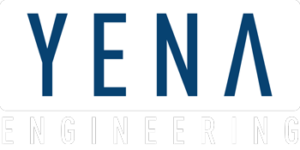In this topic, we will examine the causes and consequences of metal pipe rust, but before understanding these issues, it is necessary to understand what is a metal and metal pipe.
What is Metal
Metal is a substance that is widely used in many fields. It is used as the basic material in the manufacture of different products. For the correct use of metal, its properties need to be known. It has the property of forming under certain temperatures. Metals also conduct heat and electricity. There is a transformation of metals into various shapes. They can be used by turning them into sheets. They have a bright structure as an image. It has a high melting point structure. Steel, which is produced with metal, is an alloy. Steels are widely used in all regions of the world for various purposes. YENA Engineering is highly experienced in steel construction projects such as high-rise structures, roof systems, bridge sections, industrial structures, as well as in the manufacture of related construction equipment you can get a quote for such needs.

What is Metal Pipe
Hot steel coils are metal tubes produced from cold steel coils or coated steel coils. Metal pipes are used in quite important areas, so metal pipes should be of high quality. For this purpose, YENA Pipe responds to your needs for metal pipes by producing timely and high-quality products.

What is Metal Pipe Rust and Why is it Formed
Rust occurs when iron and oxygen enter into a chemical reaction in humid or water environments. As it can be seen from here, rusting is a chemical change. Rust contains iron oxides,iron oxide hydroxides, which have undergone a chemical reaction with the water in the environment in which it is located. Rusting can be of various kinds. Some of them are even noticeable to the naked eye. The spectroscopy method is also used to detect some rust. Rust or rusting is a term that is widely used in the wear of steel due to iron and iron alloys.
In fact, other metals undergo similar wear, but the condition that occurs is not rusting, but oxidation. When oxygen, water and all kinds of iron masses come together for a sufficient period, decaying is inevitable. At the end of this process, the metal rusts and disintegrates. If stronger corrosives are mixed into the work, for example, brine, the functioning will be accelerated excessively, the metal will quickly rust.

Rust occurs inside and outside the pipes. Due to the high pH levels in the water, internal corrosion occurs and dissolves the inner protective layer of the metal pipe. External corrosion is usually caused by leakage. When left unchecked, rust or lime accumulates in the pipes and blocks the flow of water. In addition, deteriorated pipes have a higher explosion or leakage due to structural damage.
Some of the Types of Rusting
- GENERAL CORROSION: This is the most common form of corrosion, which usually occurs evenly over large areas of a material surface.
- PIT CORROSION: It can be difficult to detect pitting corrosion, which is one of the most aggressive forms of corrosion. This type of local corrosion can be in a form that is invisible to the eye. This type of corrosion grows perpendicular to the metal material, disrupting the physical strength of the material and can lead to its rupture or cracking at an unexpected moment.
- CRACK CORROSION: This type of corrosion occurs in areas where the airflow decays or stops (the surface where the bolt head contacts the material, the surface between the flake and the metal surface, etc.). This type of corrosion can be minimized by designing the joint well.
Methods of Solving Metal Pipe Rusting
- Water is an important cause of corrosion. Too low a pH level in the pipes can damage the lining of the pipe. You will also want to monitor the oxygen levels in your water. Oxygen leads to rust and can cause build-ups and blockages. It is a good method to keep water temperatures low when possible. Warmer water tends to be more corrosive.
- Pipes must be kept clean. Microbiologically induced corrosion occurs when metals are exposed to corrosive bacteria. You can use inhibitors or biocides to keep fluids clean. Another option is to consider chemical treatment for water or other liquids.
- Their structure must be kept stable. There is friction, shaking and bouncing wear on the metal. When openings begin to form, the abrasive material comes into play and can cause crevice corrosion. A good way to prevent cavity corrosion is to use pipe support. You can contact YENA Engineering for quality solutions that pipe support will provide.
- Precautions should be taken against metal-metal contact. Not all metals can get along. The best way to protect against metal-to-metal corrosion is to insulate the metal. Installing insulators such as wear pads or pipe shoes for piping should be considered. Insulators create a buffer between metals, so the metal stays durable longer.
For the absence of such problems in your home or business, or the solution of problems, YENA Engineering will take care of it for you. YENA Engineering offers you a fast and qualified solution with its competent and experienced infrastructure.

